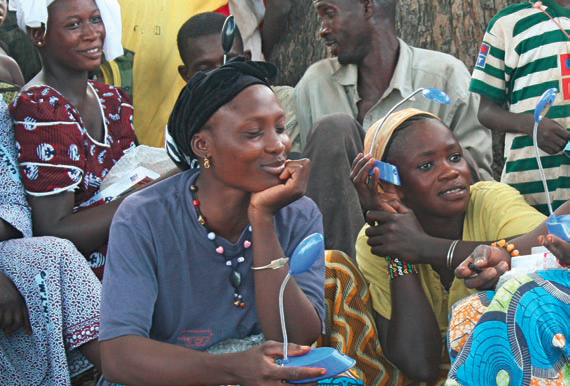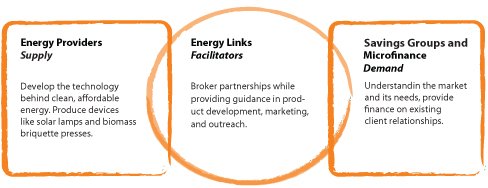A development opportunity exists at the intersection of pro-poor energy and finance.
 In the developing world, using a lamp or cooking the evening meal is not as simple as finding the nearest electricity outlet. Energy sources are often limited, and for 2 billion people around the world, that means daily use of kerosene, charcoal or firewood – which can be hazardous, expensive, and damaging to the environment.
In the developing world, using a lamp or cooking the evening meal is not as simple as finding the nearest electricity outlet. Energy sources are often limited, and for 2 billion people around the world, that means daily use of kerosene, charcoal or firewood – which can be hazardous, expensive, and damaging to the environment.
Households in subsistence economies often spend as much as 30 percent of their income on lighting and cooking fuels. Children suffer from indoor smoke, and the environment suffers from the emission of greenhouse gases and deforestation. As the developing world advances economically, pro-poor, sustainable energy solutions are needed - and they exist!
 Energy Links, a project of the Center for Financial Inclusion, (now completed), sought to use savings groups and microfinance as a platform for providing and supporting pro-poor energy solutions. The objective was to create commercially-driven, scalable, affordable, and clean energy products with widespread distribution.
Energy Links, a project of the Center for Financial Inclusion, (now completed), sought to use savings groups and microfinance as a platform for providing and supporting pro-poor energy solutions. The objective was to create commercially-driven, scalable, affordable, and clean energy products with widespread distribution.
THE ENERGY LINKS APPROACH
The resources and technology needed to bring clean, affordable energy to the poor exist. What is lacking is effective collaboration among suppliers, finance sources, and distribution networks. The Energy Links staff acted as an intermediary, helping to establish effective partnerships.

Projects
Solar-powered lamps light up homes in Uganda and Mali. After careful examination of the needs of the rural households in Uganda, Energy Links identified a huge potential market for solar LED lamps. Focus groups with rural villagers helped narrow down the most marketable product, and a supplier with a suitable product, Barefoot Power, was identified. Along with local and international NGOs working to promote savings groups, Energy Links helped to develop the marketing and distribution model that has led to the sale of tens of thousands of lamps.
Biomass briquettes are an affordable cooking fuel alternative in Uganda. Energy Links trained community-based organizers in Uganda to make cook stove briquettes out of readily accessible bio-matter, and in turn, the organizers trained over 2,000 village participants. Most participants create biomass briquettes for their own use, but some have started to use this knowledge to create microenterprises around the product.
The Energy Links Project facilitated access to energy for tens of tousands of rural families. It also revealed essential pratical lessions for anyone wishing to tackle the challenge of energy poverty. These lessons are presented for practitioners and project designers in the report "Microfinance and Energy Porverty". The Energy Links Podcast Series is a unique resource with interviews by energy innovators and practitioners, hosted by the lead Energy Links consultant Paul Rippey.
The Center for Financial Inclusion’s Energy Links Project was made possible through a grant from USAID through the FHI 360 FIELD Project and a grant from the Wallace Global Foundation.



